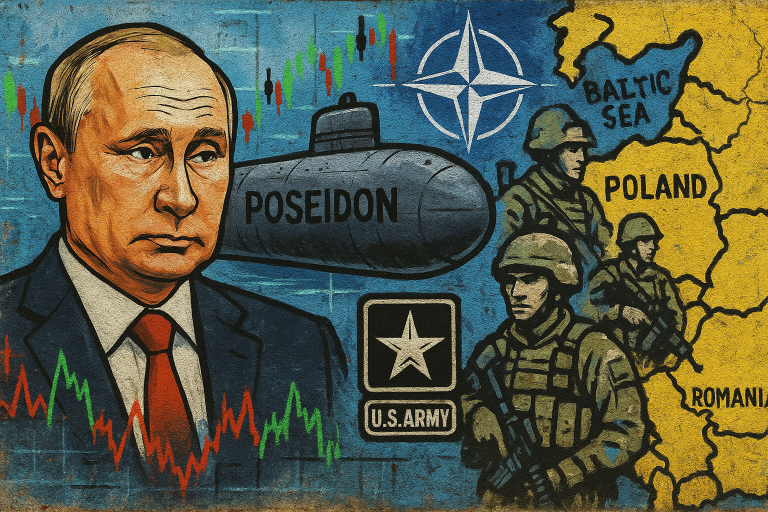A wave of geopolitical and economic developments shaped the midweek landscape across Europe.
From Moscow’s latest military display and US troop repositioning on NATO’s eastern flank to mixed closes in European markets and a humanitarian response to Hurricane Melissa, Wednesday’s news reflected the interplay between security, policy, and financial sentiment across the continent.
Putin hails successful test of nuclear-powered “Poseidon” drone
Russian President Vladimir Putin announced on Wednesday that the country’s nuclear-powered “Poseidon” unmanned underwater vehicle — often referred to as the “doomsday torpedo” — had been successfully tested.
Speaking from a hospital where he met soldiers receiving treatment, Putin described the test as a “huge success” and claimed that Poseidon’s power “far exceeds that of our most advanced intercontinental missile, Sarmat.”
He further asserted that the underwater drone was “impossible to intercept” and that no comparable weapon system was likely to emerge “anytime soon.”
The Poseidon, long touted by Moscow as a next-generation strategic weapon, is designed to carry nuclear payloads and operate autonomously.
Putin’s remarks come amid heightened tensions between Russia and NATO, with defense officials across Europe closely monitoring developments tied to Russian military advancements.
European stocks end mixed ahead of key central bank decisions
Major European stock indexes closed mixed on Wednesday as traders awaited crucial monetary policy updates from both the US Federal Reserve and the European Central Bank (ECB).
The German DAX fell 0.64%, weighed down by a 10.39% slump in Adidas shares following its quarterly earnings report.
France’s CAC 40 also slipped 0.19%, dragged by Air Liquide’s 2.44% decline.
In contrast, the FTSE 100 in London rose 0.61%, supported by an 8.77% gain in Next plc.
The pan-European Euro Stoxx 50 ended the session flat.
On the currency front, the euro traded steady at $1.16605, while the British pound dipped 0.28% to $1.32351 as investors adopted a cautious stance ahead of rate announcements.
US to reduce troop presence on NATO’s eastern flank
The United States confirmed it will scale down its troop presence in select NATO member states as part of a review of its military footprint in Europe under the Trump administration.
According to the US Army, the move does not signify a withdrawal or weakened commitment to NATO’s Article 5 defense clause but reflects growing European capability and shared responsibility.
The redeployment will affect Bulgaria, Slovakia, Hungary, and Romania, with the 2nd Infantry Brigade Combat Team of the 101st Airborne Division returning to its base in Kentucky.
Romania’s Defense Minister Ionut Mosteanu said the country would retain around 3,500 foreign soldiers and continue strengthening its regional defense alongside NATO allies.
Polish jets intercept Russian reconnaissance aircraft
Poland’s air force intercepted a Russian Il-20 reconnaissance aircraft flying in international airspace over the Baltic Sea without a filed flight plan or transponder signal.
The Polish military confirmed that the aircraft did not enter Polish airspace.
The interception follows a series of airspace violations in September, when three Russian jets entered Estonian airspace for 12 minutes, and over 20 Russian drones crossed into Poland.
Officials said the latest incident underscores Poland’s vigilance amid heightened regional tensions, while NATO reiterated that it continues to monitor Russian aerial activity closely.
The post Europe bulletin: Putin boasts of ‘Poseidon’ test, US scales down NATO troops appeared first on Invezz

